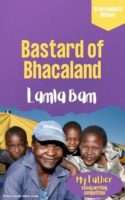“Your father says his wife has died,” my mother reported. I knew her sad eyes were an attempt at common decency. Behind the veil of supposed empathy lay a tornado of excitement. I am her daughter and know her like I know myself. I managed to quickly get her off this fake sympathy into excited giggles shared with a cup of coffee.
“I can finally go home. The bastard of Bhacaland can finally go home!”
My father once told me in a call that my dear mother was aware that he had a wife in the former Transkei but Alexandra, Johannesburg, in the late eighties was a place where ‘migrant’ workers from the bantu homesteads could not live with their wives. So the men fell in love with beautiful maidens who had come to work as domestic workers in Sandton and the rest is history.
I was born a sin in 1998 and until a concerned wife deep in the belly of the Transkei started realising her husband sent too little money home, I had a father in my life.
It was a sunny day and a photo of Joe Slovo, the heroic communist, hung above the pillows where the three of us were lying, listening to Lucky Dube and laughing like doves in a nest. A father, a mother and Sunshine. My father calls me Sunshine. The angry wife beat my mother off her husband with a stick and called her a ‘township whore’.
Later, I would grow up with an aunt in my own mother’s home town in the Transkei. When I asked of my father, I was dissuaded from contacting him as ‘women from Bhacaland in Mount Frere poison children born out of wedlock’.
That is why 19 years later – when my father called to tell my mother and I that his wife had died – we were elated.
That is because we are foolishly hopeful women. I waited for my father in Mount Frere, next to the stand where another aunt of mine sells fruit, for days.
I was 21 and he had promised to meet me there and we would take a car to his village where I would meet my half brothers and sisters. For weeks, I went back to my aunt’s house dejected until the end of the December holidays when he suddenly told me he had gone back to Johannesburg.
He had dodged me. He had run away from the Sun.
When I got back to Port Elizabeth, where I studied, I counted my blessings and moved on. I thought of my many aunts and cousins. My tribe who had raised me. And, I was contented. I know my people love me.
I think of my Father as an elusive dream. Silk escaping my hands never to be caught again.
***
This was a winning entry in the My Father essay writing competition. Click here to read other excellent essays from the competition.



